‘We’re Building More Than Houses’
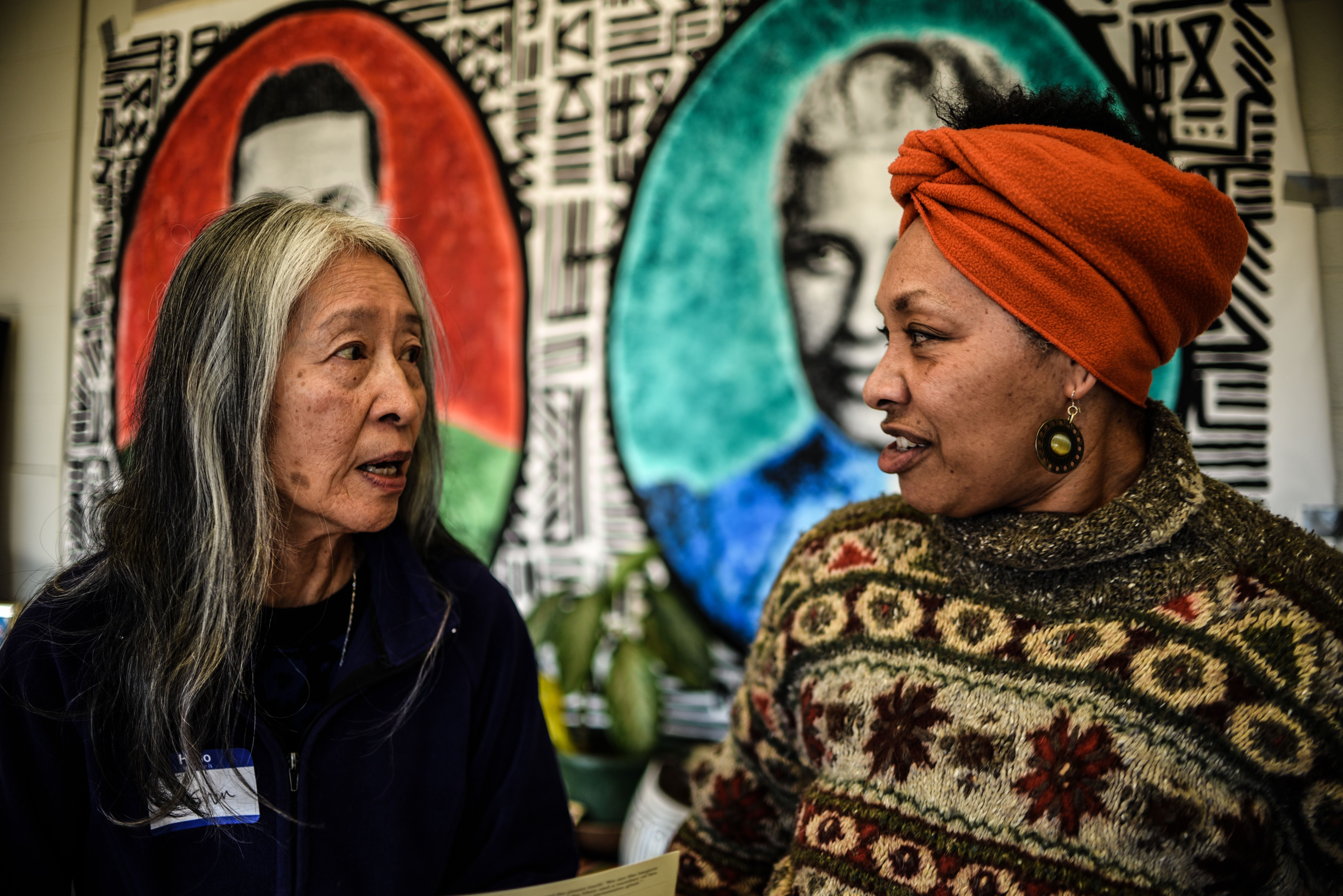
BeLoved Asheville is a nonprofit organization whose mission is to cultivate a transformational way of life that is rooted in community, creativity and equity. If you live in Asheville, you probably have seen their street pantries, free farmers markets in BIPOC neighbors and elder communities, protests for Black Lives, or trans rights, or the right to affordable housing. You may have been in their presence at a community dinner or a public meeting with elected officials, or you’ve seen a news segment about their advocacy work.
BeLoved’s work takes many forms and it evolves as time goes on. In response to the current housing crisis, BeLoved Village is taking shape in East Asheville, a community of a dozen sustainably-built equity-bearing homes, each between 440 and 700 square feet, will be occupied by people who earn between $750 and $1000 a month. BeLoved’s food equity program has distributed roughly 10 million pounds of food since 2017. The organization saw a lack of health equity and so in early 2017, it organized what they would later learn is the nation’s first street medic team that is made up of homeless and formerly homeless people who have trained with emergency medical professionals and nurses. The program’s success and longevity (some of the original medics are still on the team) is being studied as a model in other places, and its approach to disseminating culturally relevant public health information at the start of the pandemic was used across two states. BeLoved has also helped shape public policy and created cultural organizing programming that has served more than 5,000 children/youth and trained well over 100 community leaders.
The following conversation is as wide-ranging and energizing as BeLoved Asheville itself. It took place on March 15, 2022 at East Fork headquarters.
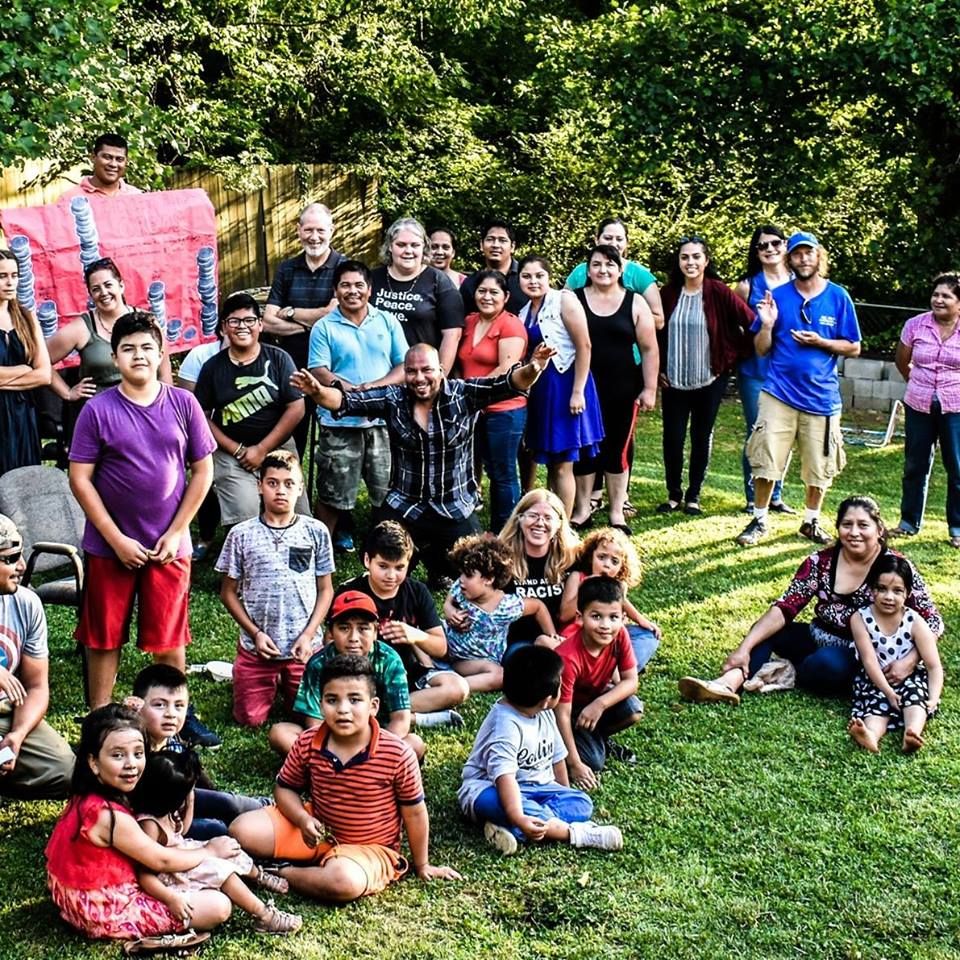
East Fork: Let’s start by talking about creativity and community. How do those ideas show up in the work done by BeLoved Asheville?
Ponkho Bermejo, Co-Director: We believe in creativity. You can solve a lot of problems when you think outside of the box. We are a group of people who have a lot of creativity and love for the community. We believe in the Power of We. Everyone has a role to play in making this a better community. To make it happen, you have to change systems and create innovative community-led solutions. Whether we are sharing houses or food or diapers or plants for backyard and community gardens, it’s always with the same goal of building community. We are the people to solve the problems. We’re not waiting for anyone. Because we are the hope.
Amy Cantrell, Co-Director: We are the hope! For us, it’s really incredible to be in the front row of watching what community does when community comes together. Sometimes we’re pinching ourselves because we had no idea we were going to do something at this level, but it’s because of that power of community.
We tell this story of one of our Community Leaders, a woman named Marta. She was watching what was unfolding on the streets for people in the pandemic and she said she wanted to make some pupusas for people on the streets and that led from pupusas to having people housed in a hotel and a systemic change that helped us change the state-wide level. It’s little moments in which one thing leads to another thing that leads to another thing that changes big things. We are helping friends on the streets housed in that hotel come home and are advocating for emergency shelter for all and accessible to people often left out of shelter: intact families, quer and trans people, people with pets, people who have lost or don’t have government-issued identification (required for entry at shelters) and single-dad families, to name a few. We met Marta during the ICE raids almost five years ago and now she’s one of our major leaders in terms of covid response. She was one of our 15 Latinx community leaders speaking for the first time with an elected official, a State Senator, about trying to create Driver’s License for All in the state of NC. That Senator, within days of the conversation, became a primary co-sponsor of a bill to make Driver’s Licenses for All a state law.
That’s another thing I will say about BeLoved: it is in every way, how community builds. We’re in relationships and that’s the essence. Then, at any given moment, what happens to, about or around the community is how that Power of We comes together to say, how are we going to live collectively in this moment? One of the things that is so powerful about BeLoved is, it wasn’t created to be just one thing. It was created to be a living, breathing, organic, connective tissue for community to do what it needs to do to thrive. That’s the power of it. It can be and do all these things, sometimes all at once.
Ponkho: What we never imagined was that it would be normal people, people who were in pain because of systems, who would be the ones changing systems. We had a forum about immigration reform and we had people sharing their experiences, it’s creating this experience where people can be part of the change. We have changed policing, housing, and education policy, impacted city budgets, created more transparency in government. We have brought local black history to schools and helped parents learn the Constitutional rights of their children in the educational systems. We are the channel, the glue that connects one thing with another, connects one neighbor with another and through that collective, big changes can happen.
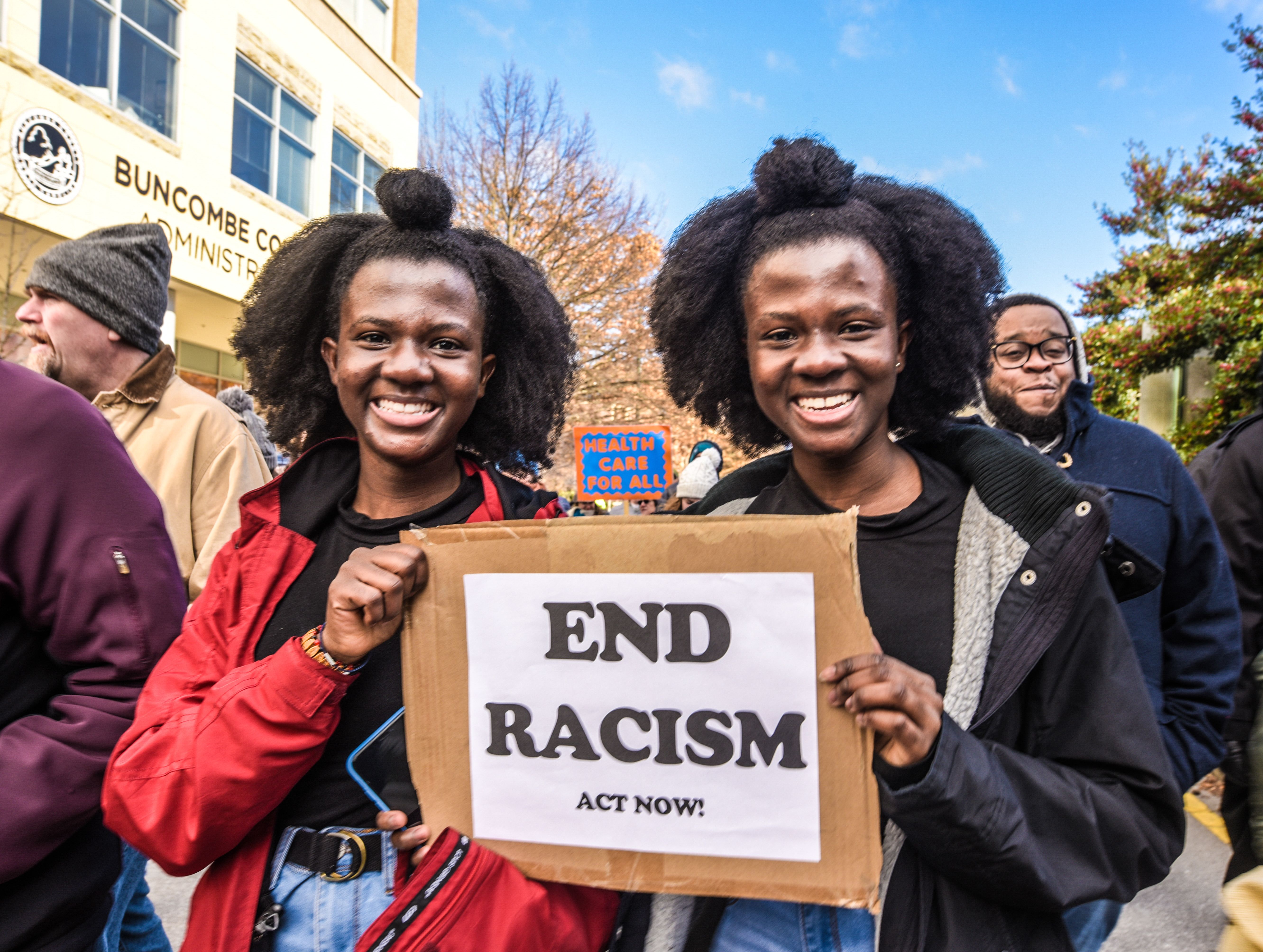
East Fork: I wanted to also ask you how the intentional way that BeLoved uses language, both in how you refer to “friends on the street” as opposed to “clients” or “homeless people” or something like that.
Amy: The essence of everything we do is that each of us is a unique human being. It’s saying “I see you” or “I see you in your full humanity.” One of the reasons BeLoved started was, nonprofits were institutionalized and they were doing “client case management” but the truth is, we need each other and we often put these barriers in place, like “this group of people takes care of this other group of people” instead of seeing the deep mutuality and finding out how, if we were just in relationship with one another, wouldn’t it change a lot of the “-isms” that we see? We say they’re our friends on the street because in actuality, that is what they are: friends. And knowing people by name, hearing each other’s stories, eating together allows us to build relationships and begin showing up to support each other. My struggles are your struggles and my joys are your joys and vice versa. We begin to dream together and transform the world so that we all thrive.
Ponkho: The adjective “homeless” doesn’t describe who they are. Without that label, they can just be themselves. Other organizations call people clients and as for me, I never go to meetings and call myself one of the co-directors of BeLoved because this creates a division: who I am and who you are. I came to serve you. And people just think, “I can just work with you and I know you aren’t here to ‘save’ me.” Calling someone “client” is very disempowering.
Amy: Right. It’s like we’re saying, “You’ve got to be fixed and rescued,” rather than “You have gifts, you have passions.” We often ask people what are their hopes and dreams. They want to be engaged in the community that they live in and do things they are passionate about and are gifted to do. These are people who usually get left out, when really, we can be our own solutions. In fact, some of the most innovative work that we’ve done has come out of sitting in a room together, coming up with ideas that bubble up out of lived experiences. It’s a very different place to stand. It’s not that I have all the gifts and you have all the need. We all need and we all have gifts, every single one of us.
The language in our community is drenched in mutuality, intersectionality. That’s the expectation. To see our friends on the streets helping to pack boxes of food during the ICE raids and really beginning to get that. We had a trans woman who was part of our Vance monument protests and calling for reparations (a racist monument at the center of our City that has now come down) and we had people who were impacted by systemic racism who were fighting for the rights of trans people. It was out of a love for each other, like “if they’re coming for you, I’m going to stand with you. I’m going to do all of the things I’m supposed to do as a human being who calls you ‘family.’” That is one of the remarkable things that makes BeLoved a transformational agent in the world right now. Our nation is so polarized. But we know if we take the time to connect in community, amazing things begin to happen. And this is how we transform these systems and use all of our gifts and resources to create the community and world of our dreams. We’re on our way there in a big way.
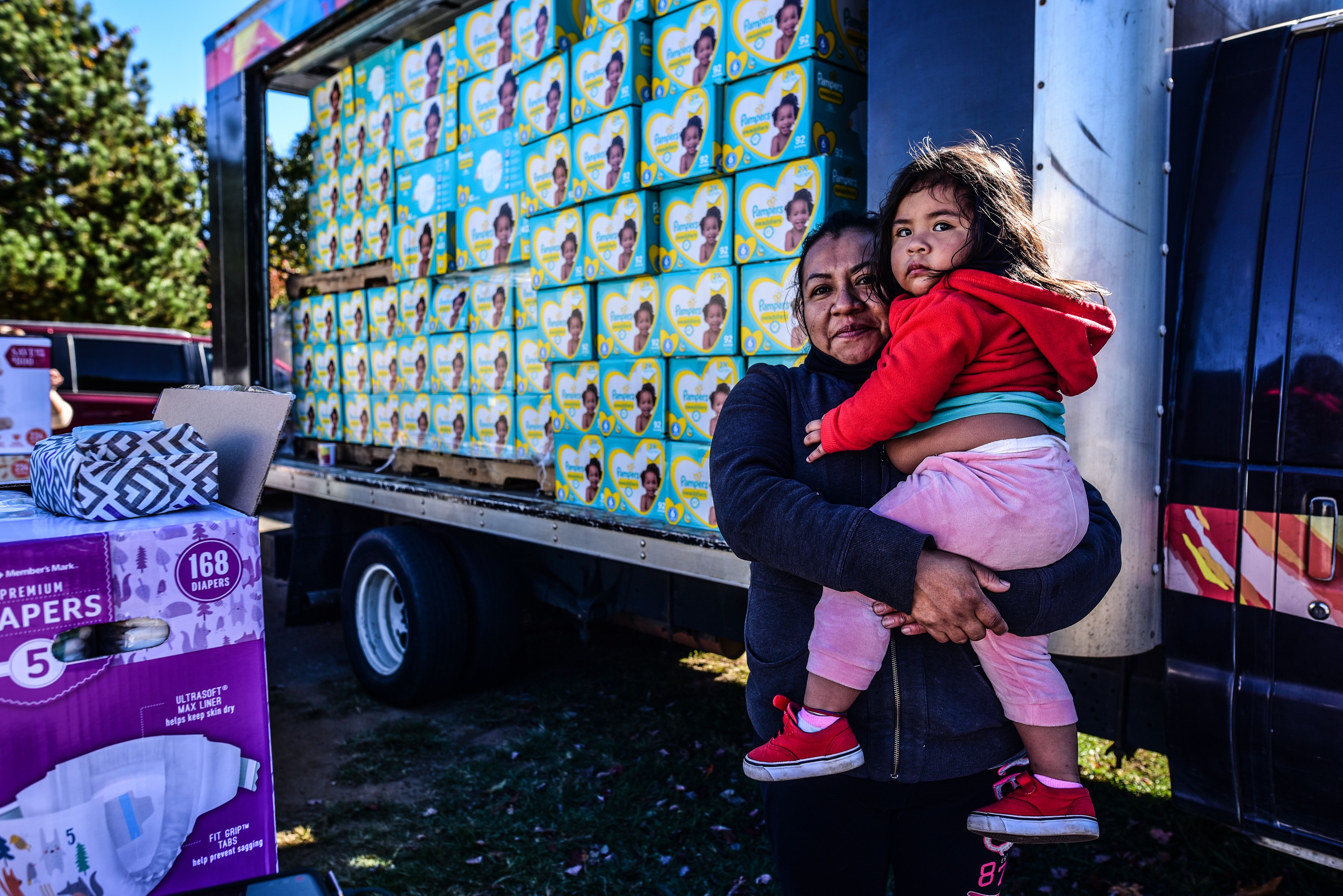
East Fork: Where does BeLoved operate from?
Ponkho: We don’t have an office-office. Our office is wherever we are and are connecting and working with the people.
Amy: Instead of labeling each other, we become who we really are to each other. It becomes this lens through which to see the vision we share. It started with an open door and connecting with people, whether we were loitering in a park or opening our living room up to whoever might come. That grew into this incredible work that came from relationships. We started talking together or singing or going to marches together and then we started taking on issues because we knew each other. When an issue becomes humanized because of someone you love, you want to do something about it and that’s how we begin to fight for each other.
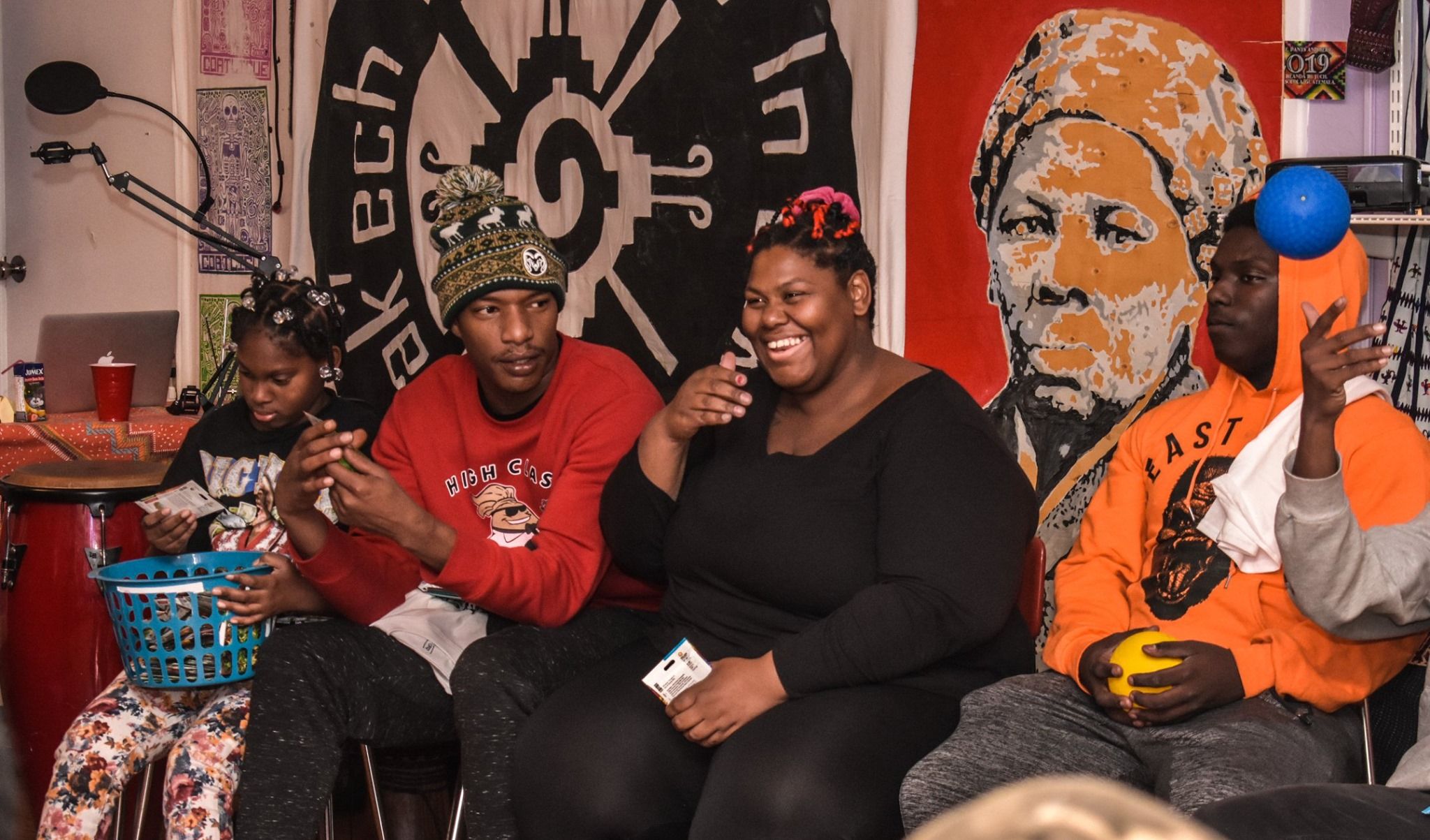
East Fork: How did BeLoved get its name?
Amy: When community comes together and calls the impossible down, and sees it happen, well, we have seen a lot of those moments. We’ve shaken systems and seen them come down. We have dreamed dreams and made them come true by rolling up our sleeves and created something that was needed together. And it all comes through the power of love. That’s where our name comes from: Dr. King’s Beloved Community, his vision of a new place where none of these systems of oppression exist and where we’re in right relationship with each other. If we look at each other out of our belovedness, to see each other as “I want you to be loved and I want you to be love out in the world.” Love is a powerful thing, not the saccharine Hallmark thing, and it really has the power to transform things in the deepest ways we can ever imagine. We started in the fire of this moment and what we’ve built is family. A lot of people would answer the question “what is Beloved?” with “BeLoved is my family.”
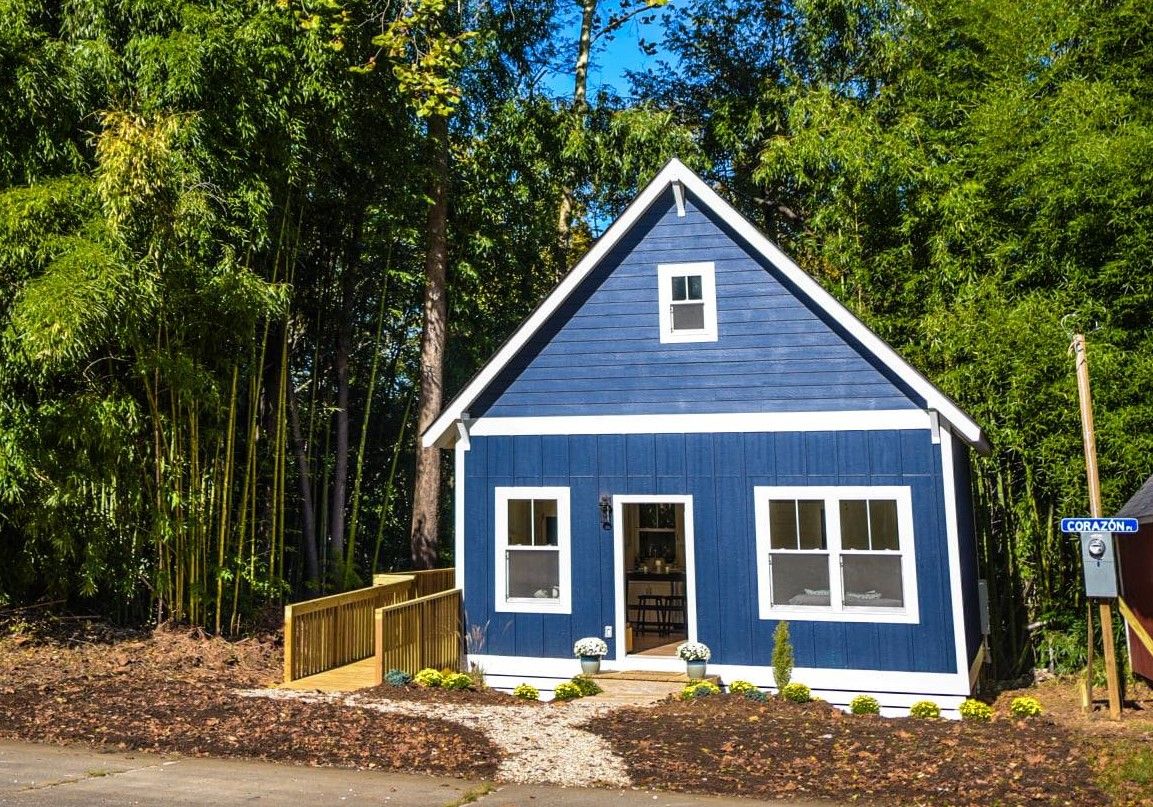
East Fork: I wanted to also ask you about BeLoved Village, twelve deeply affordable micro-homes in East Asheville that will give their residents equity. Why is that important?
Amy: Home is the place we can truly be ourselves. Sure, a home is walls and windows and doors but home is more than that. For us to be building homes, connected to BeLoved, that feels like a place people can find their place of sanctuary when they can fully be rooted in their community in a way that lets them share their gifts. Think of a ballerina or an ice skater, spinning. How they do that is by finding the point that can come back to. You make the rotation and come back to that point and you don’t get dizzy. That is what home is. You go out into the world and do all these amazing, wonderful things or you experience intensely difficult or painful things but then you come back to that point, our center. Home ideally is where we can be our most authentic selves. It both meets our survival needs but can be our sanctuary, the place we always come back to. I think of people who don’t have that, or that place is threatened. I think of people of color and the long vein that runs through racism that has the word “housing” on it.
Policy after policy, decade after decade, systemic racism was in full force. So when we talk about building homes, it might not be very popular to talk about racism but it’s really important that people understand all of the ways that have come up over the years in Asheville, whether it was redlining or urban renewal or gentrification past or current. Equity is that game-changer when it comes to housing. It’s the way a lot of white people built their wealth outside of chattel slavery when that was happening. It’s where a lot of people make their wealth but where a lot of other people are deprived of that wealth.
About 70% of Americans don’t have the ability to cover a $500 emergency. So if we can create homes that are deeply affordable and have that equity, we have the power to lift people out of poverty and overturn the systems that were meant to deprive certain people, certain populations, of equity and the ability to stay rooted to the places they love and where they’re living their lives. Building equity for the residents was a non-negotiable when we started thinking about building homes. This is the first deeply affordable housing that offers equity.
Ponkho: At one point, in every meeting we went to, people were talking about affordable housing. For me, that quite literally means housing that people can afford. But the people we were talking to said, “We can’t afford ‘affordable housing.’” The language got corrupted and didn't really mean what the words actually said! So for BeLoved Village, we knew we had to create a new word: deeply affordable housing.
Amy: Before the pandemic, we had a circle made up of people living through the housing crisis and “deeply affordable housing” came out of one of our conversations and we all started using that language. Then, recently, I was on a panel with city staff and elected officials and they were using the term deeply affordable. And I thought, I know where that language came from. By changing the language, we began to see priorities shift at the City and County level via a change in language.
In that circle of people who were directly and literally experiencing the housing crisis, we began to talk about and dream about what if we could create our own homes and communities, what if we could create part of the solution that was missing. We spent a whole year doing research about housing without telling anyone, but it was that same circle that started in 2015 to talk about the housing crisis that decided it had to be us doing something about it.
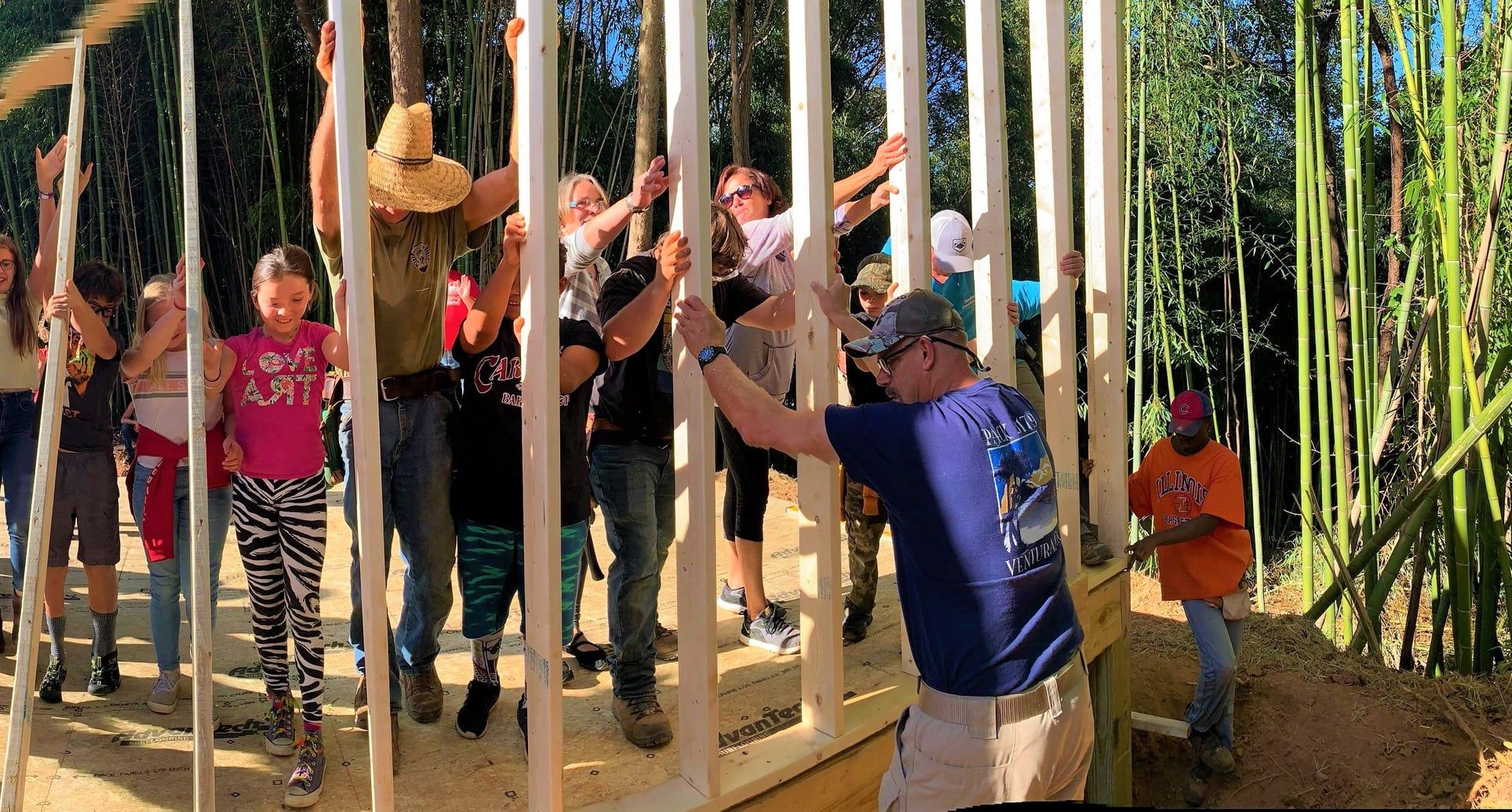
East Fork: Can you tell us more about the homes and the community they people who occupy them will create?
Amy: People can start thinking about their hopes and dreams and also, what they can leave to the next generation. So many people have been denied generational wealth and on the ground, where we are, you see who’s been pushed to the margins, who is living in housing that is unacceptable or on the street or being pushed out of our community due to lack of housing options. With our houses, there will be 600 square feet with equity that come fully furnished and have pottery in them. Thank you, East Fork! And art from artists. And community, because everyone who lives there will have a role in building a strong neighborhood with intention. And the homes will be built sustainably in the midst of the climate crisis.
BeLoved Village came out of a tragedy. We had a woman who died on the streets. She was a Jane Doe for five days until she was identified by our community as our friend Janet Jones. On the first cold night in October, 2016, she froze to death. We had that circle that had been meeting weekly and everyone in that circle said that we need to have a public funeral for her. We value her and she’s our family. It was very important and we all wanted people to know that this happened. People wanted the news to say that homelessness is a public health emergency. Typically, it’s labeled as a public safety problem and then people get criminalized. It sparked something big among us. And in that weekly circle, somebody said, what are we going to do about this? Not the government or some agency but we in this room. I always credit that moment with creating this sea change. It led to people wanting to learn what to do in a medical crisis if something happens and we’re deep in the woods. We don’t always have phones. It quickly turned into the Street Medic Team, which was operating by February 2017. We had people train with nurses and EMTs and it’s been running ever since. We learned a couple of months later that it was the first homeless street medic team in the nation. It’s been really empowering. People introduce themselves as a street medic, which is for them like a vocation. A lot of those original people who are still on the team, including some formerly homeless people who have stayed and continue to do this work.
Ponkho: I really believe that this is powerful because the focus is pure community. It is how can we create a place where people belong and have purpose, a place where the real goal is community, not money, not objectives, not doing something to you or putting you in a box or file folder. But where we are really looking to build genuine relationships in community and then create together what no one of us could create alone.
Amy: BeLoved Village is a testament to all the other stuff we’ve been working to do for a long time. At the end of that year of research, we knew we had to be “all in” because we knew that people knew we had never done anything like this before. And now, we’ve had people from all over the country studying what we’re doing. We’ve turned how affordable housing is done upside down, and that’s what came out of that year of research, studying the mechanics of how it’s been done. It’s how we came to understand why no one gets to deeply affordable housing. As we pulled it apart, we found a way. We had to scale up and now we have a construction company called BeLoved Builders. It’s a subsidiary of BeLoved Asheville and we now have an unlimited license in the state of North Carolina. I got my general contractor’s license and that’s huge! It’s exciting to see what we can do. It’s not building a village: it’s building a recipe for how we can build villages. It’s a community made up of a lot of people who have been affected by the ‘isms’ who are wonderful but who have been left out and now they’re at the very center of something that’s really new and innovative. We’re building houses but we’re building something bigger, too. The community gets to participate in the actual process of building. And when people move in, they’ll find there’s a whole community there to support them, grow gardens with them and eat together. We’re seeding a community in that place, even before people live there. What we find is that people who develop housing aren’t always good at developing community. They don’t think about that piece. It’s “I’m going to unlock my door and go into my spot.” Not interacting. We have years and years of building community in a place, coming together with people we don’t know and doing something bigger than all of us. The pandemic really revealed how much we need that. It’s the thing that can heal the world.
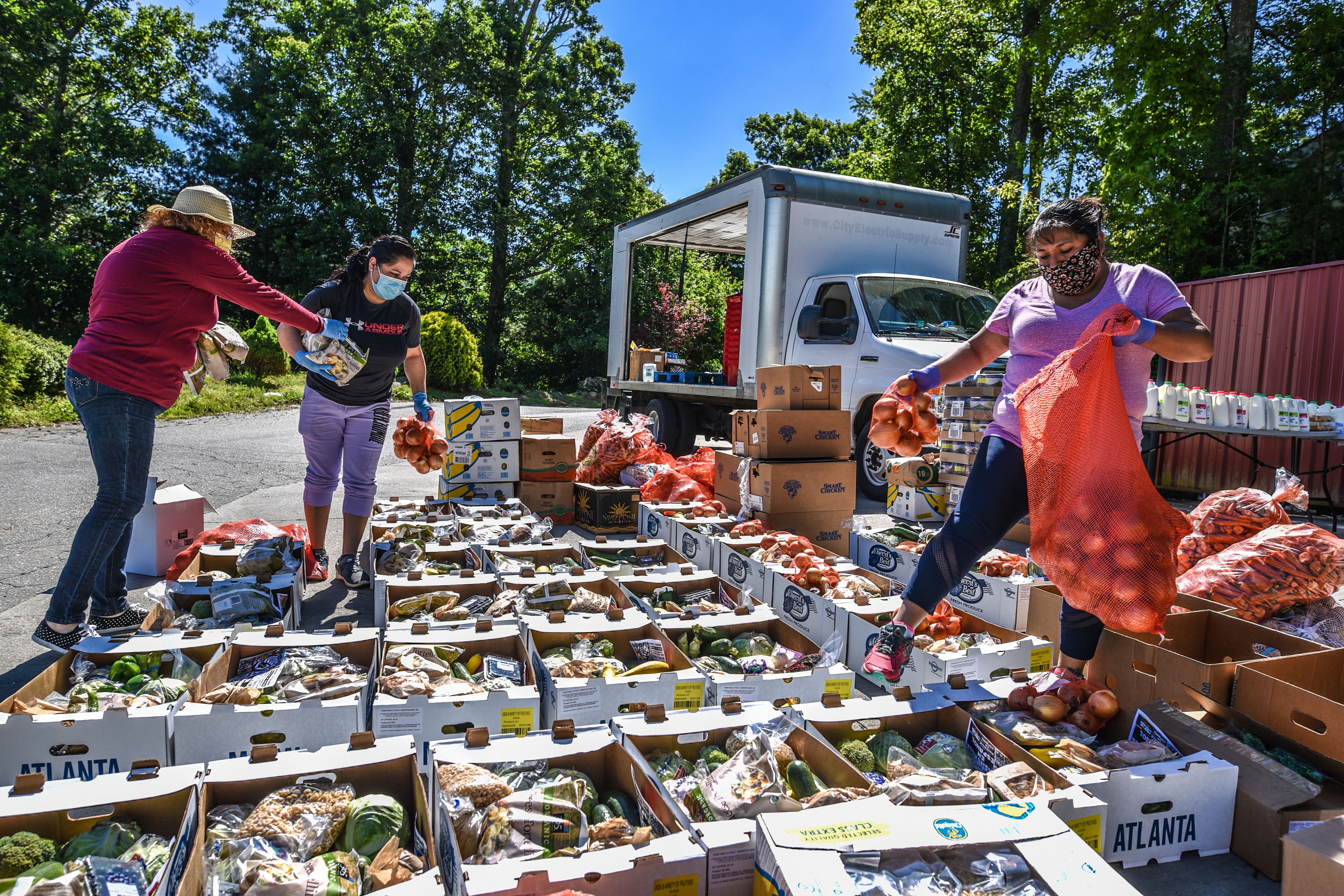
East Fork: How did BeLoved respond to the pandemic?
Amy: We were able to distribute over five million pounds of food during the pandemic. We met Community Leaders right in their neighborhoods and started working together to inform people of how to keep the community safe amidst the pandemic, providing PPE, information, sharing food, diapers and resources. We knew we would get through this together if neighbor supported neighbor. So it was through this incredible network of community leaders that we were able to do it. In the midst of these intense pandemic days, kids were doing virtual school so when we drove the truck down their streets, they were able to come out and help unload the boxes and participate in what we were doing. What it taught them is, we have the tools and resources within ourselves to support each other and to bring whatever it is that people need.
Ponkho: When we were distributing food, people said that they would distribute it from their houses and they could organize and share. The most important thing we can do is know who lives in our neighborhood so much of our work is re-knitting people and neighborhoods back together. Because then if people have any problems, they can call the people who live beside them because they know each other. It’s going to be faster than 911 or anything else. There was one of our community leaders who had a death in the family during covid and it was the neighbors who she had worked so hard to help in the pandemic who in turn helped her in her time of grief with the money for a funeral by making and selling traditional foods. This is the goal: when you know the people around you, you are never alone. The more that we know people, the easier it will be to accomplish the biggest goals that we have.
Amy: One of the first things we did in the pandemic is realize that people needed information. It seems those that were most at risk of the pandemic were the ones left out of the information loop. We worked to create culturally relevant information about the pandemic in the language of the people like our series of Black Panther covid posters. These informational posters were later used in two different states. We got creative, thinking “I can greet people without touching them. Where did we learn that? The movie Black Panther!” This is a cultural message we can send out that says, “Oh, that’s for me. That speaks to my heart” So that’s how this life-saving information got out to communities most at risk. Or seeing Sol dancers or Virgin of Guadalupe, washing her hands. These are powerful images. We told medical professionals that we have to translate the information that is life-saving but put it into the language that we commonly speak and through the culture of the people.
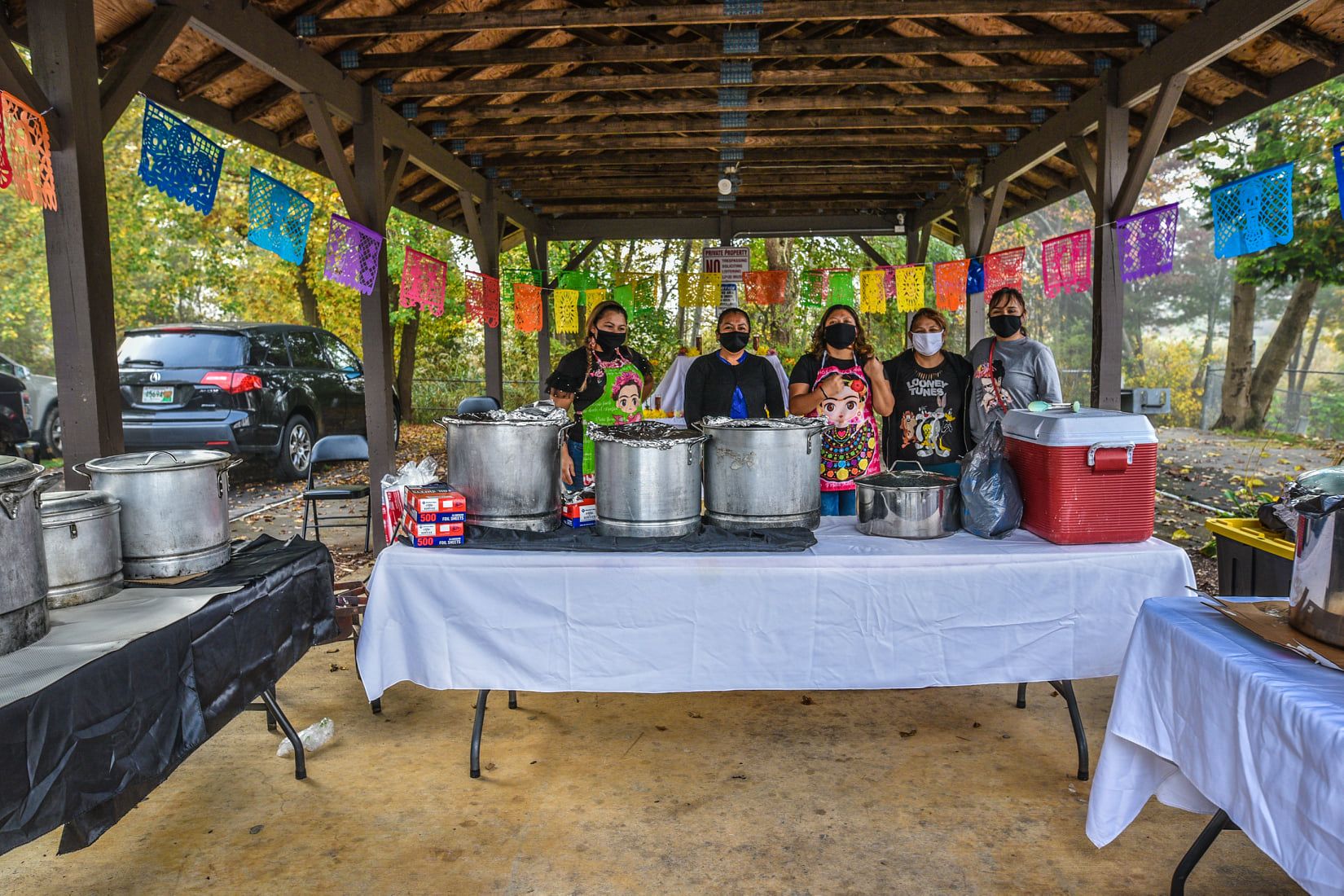
East Fork: Last question! I know that BeLoved believes in the power of sitting down together over food. Amy, when we spoke earlier, you said, “If we break bread together, we know we’re family.” I understand that BeLoved has hosted more than 1,000 community dinners and offers nutrition classes. What have you seen happen as the result of these food-centered events?
The table is the place where we nourish our bodies and our spirits. It is at the very heart of our community. We take the table seriously. Our Plants for the People project shares plants so we can grow healthy food to put on our tables. We share our recipes and have Fiestas, block parties, birthday parties, and Quince together. This coming week we are literally building picnic tables for the BeLoved Village because we know the table and the front porch are essential tools in building community. And we know that the table is the place where we can connect our hearts and where we can tell our stories and where we can create. The table is the place where we can most fully build community. And we know this is a moveable feast. Wherever the people are, we can place a table in the center and begin to connect, and dream, and build houses, oh yes, but more than that, a home for us all, and that home is community!
